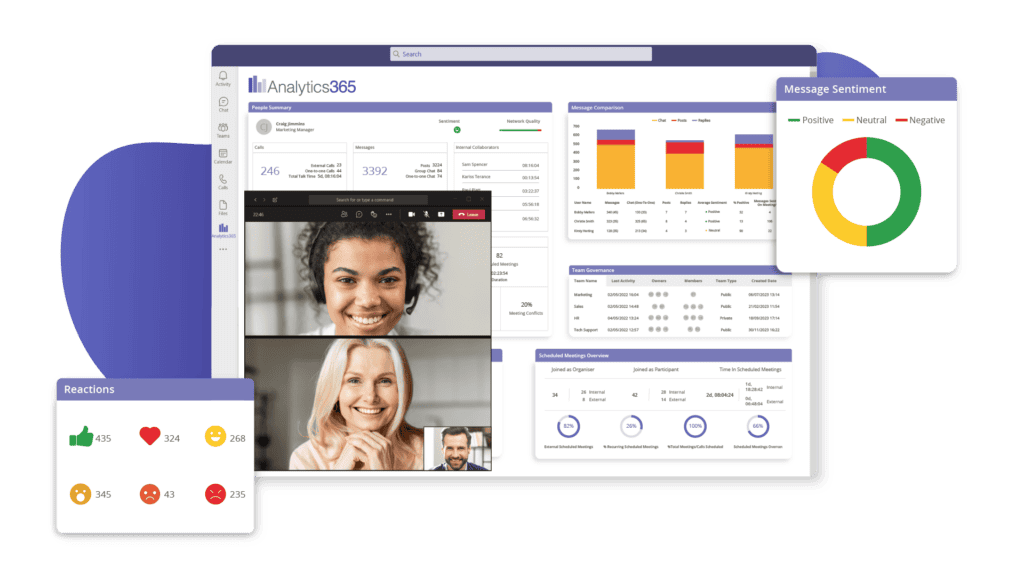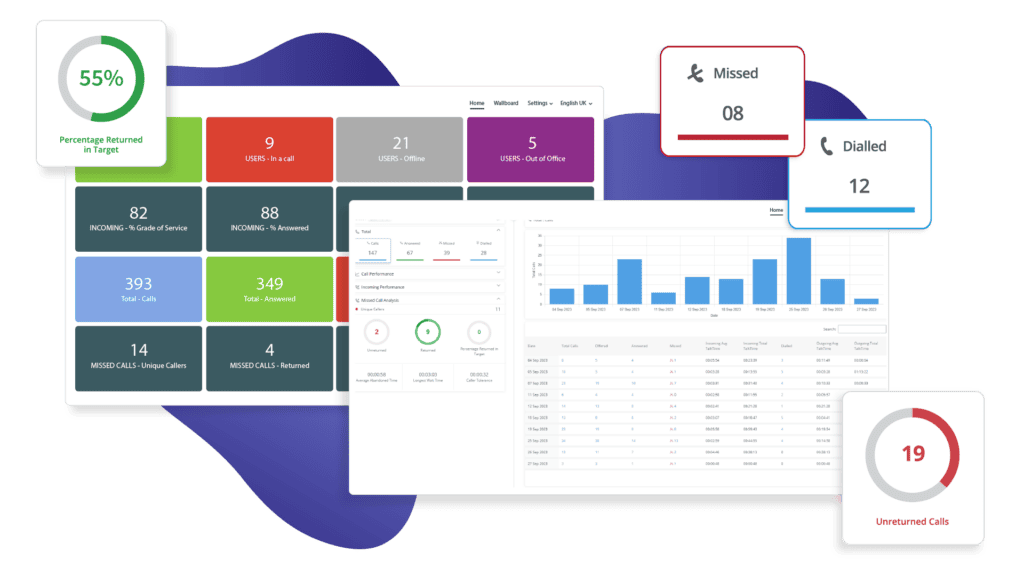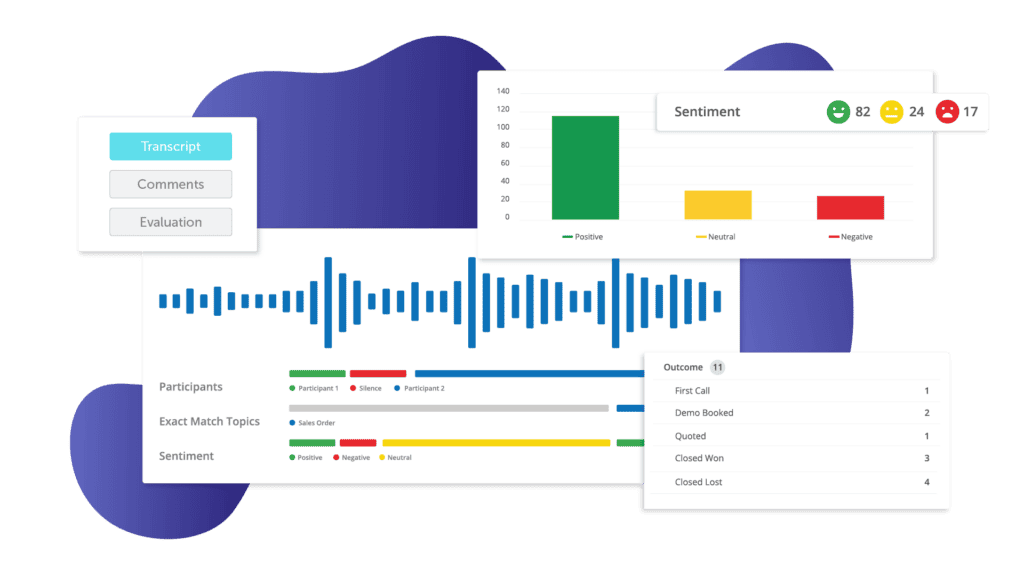Often considered one of the busiest places to work, call centers are incredibly difficult to manage. The constant work and distractions can cause managers to have issues properly executing their initiatives and even neglect key areas—such as training for teams and individual agents.
Ultimately, not training your call center agents can negatively impact your overall agent performance and bottom line – alongside causing issues with staff retention as your agents look elsewhere when they see no clear plan for their long-term progression.
Nobody wants to experience these issues, so you must find a way to turn the tide. Implementing an effective call center training framework is one of the best ways to do this. Even when your call center is at its busiest, you should still be able to make time for training and agent improvement.
How do you construct the ultimate call center training guide? Our post reveals the best techniques and gives you a full three-phase framework to follow.
The Importance of Training Call Center Agents
Call center training is beneficial for both agents and customers. When you give your staff the proper training, you’re encouraging them to perform better at their roles. They learn how to handle customers more effectively while also gaining a sense of improvement. Agents start to feel more valued as they can see their skills getting better.
This translates into a few key benefits for various aspects of your call center:
Enhancing Customer Experience
Did you know that 1.6 trillion dollars are lost every year due to poor customer service? This insane statistic highlights the importance of providing your customers with a fantastic experience.
Trained agents are more adept at this than untrained ones!
They have all the skills necessary to understand how to make an excellent first impression, how to deal with each customer based on their needs, and how to identify the right resolution processes. Going even deeper than this and training your agents in product knowledge and company policies helps to speed up the customer service process even more. They’re more equipped to answer all queries and can even provide a more personalized solution, which fosters customer loyalty.
Boosting Agent Confidence and Morale
Call center training gives your agents the confidence they need to feel good at their jobs. It’s one of the easiest ways to boost agent morale as the training programs fill them with knowledge and flesh out their skills. They know how to handle things and this makes them less stressed on the job.
Reductions in stress lead to improvements in job satisfaction, which heightens the morale of all your agents in the center. This gives your staff a pathway for career advancement, making them more likely to stay with you for the long term, boosting employee retention.
Improving Operational Efficiency and Cost Reduction
Well-trained agents are more skilled and knowledgeable, so they’re less likely to make mistakes. They understand how things work and are unlikely to provide inaccurate information or solutions to your customers.
Meaning your call center wastes less money dealing with additional complaints made after errors from your staff. If we circle back to agent retention for a moment, retaining your staff for many years also helps you save money. The current call center turnover rate is around 30-40%, meaning most centers are looking to re-hire nearly half of their staff each year. Think about how much money you save by training your agents and keeping them aboard for longer.
Training also greatly improves operational efficiency. You train your staff to handle calls more effectively so they can get through more per hour or day.
Mitigating Risks
Finally, training agents is essential to mitigating countless risks throughout your organization. They must be trained on industry regulations, compliance, data privacy, etc.
When call center agents are knowledgeable about the technical and legal aspects of their jobs, they are less likely to make grave errors that can lead to problems like lawsuits.
The Remote Training Challenge
Call center training becomes more challenging when you have a remote or hybrid environment. You must learn to alter training strategies to fit remote learning – and this requires you to consider how your remote staff can learn and how you make them stay engaged.
Thankfully, we have a guide dedicated to how to train remote employees that you can read effectively. It provides all the specific details and best practices to keep remote employees well-trained and engaged.

A Framework for Effective Call Center Agent Training
The following section breaks down our call center agent training framework. It can be applied to any call center and it gives managers a step-by-step process to follow and implement.
Taking a structured approach to training—like the one below—will help you see all the benefits touched upon previously. Each phase of the framework has a goal, and we’ll explain what needs to be done and how it can be implemented.
Phase 1: Building The Right Foundations
One reason the call center turnover rate is so high is that many agents go into their jobs without clear expectations. It’s your job to set things right from the word go. Build the right foundations so everyone knows what they’re getting from the job and what they’ll be doing daily while working for your company.
Onboarding and Orientation
During the employee orientation and onboarding processes, you need to focus on three clear things:
- Integrating new hires into the company culture
- Familiarizing them with call center operations
- Outlining the expectations for their roles
This helps new hires become part of the company and get on the same page as everyone else. They’ll know what the call center is about, what its main goals are, how things work, and what they can go on to achieve when working for you.
Implementing this is crucial as 81% of new hires feel overwhelmed with information during the onboarding process. You must keep things concise while targeting the three points above. Some ideas include:
- Interactive sessions covering company history, mission, and values
- Simple overviews of products and services for agents to keep
- Guided sessions introducing new hires to the call center tools and software
Product Knowledge and Services Training
All new agents must have a complete understanding of the products/services they will be supporting.
This is where you get more detailed with the training. Implement detailed presentations and workshops on all the key product features, benefits, and common customer questions. Product demos are highly valuable here so they see things in action. We advise developing customer scenarios based on previous customer interactions so they can learn how to deal with common queries in a more hands-on manner.
Phase 2: Developing Individual Agent Skills
Phase 1 sets the initial foundations for all of your agents. After this, they should settle into a good working pattern – and know you can shift the focus to analyzing each agent individually.
Moving from group to individual training is a big step, yet it’s crucial for individual skill development. Giving agents more personalized attention helps them perform better and feel more valuable as part of your team.
Your core objection is to create a systematic approach to assessing and enhancing the development of each agent’s skills.
Individual Assessment
Assess each agent to identify their strengths and areas for improvement. This will allow you to develop personalized training plans to bring all of your agents up to speed where they might be lacking.
The good news is that the implementation of assessments is simple when you use call center metrics and software analytics to evaluate agent performance. This can easily be done with Analytics 365 to run regular review cycles and track progress.
You should also send out regular surveys so agents can evaluate their own performance and you can understand areas where they have self-identified as needing development.
Skill Enhancement Planning
Following the assessments you set personalized development goals for your employees. These should align with two things:
- The agent’s career ambitions
- The call center’s operational needs
Collaborate with agents to establish SMART goals for each of them. From here, design individualized learning programs using a combination of digital courses, in-person workshops, and mentorship. Every single program should be tailored to meet the agent’s needs based on their assessment – talk to your agents about their preferred learning styles too so you can fit the program to their preferences.
Implementing Personalized Agent Development
In this step, you want to give your call center agents everything they need to follow their personalized development plans successfully. You should cater to their unique requirements and needs and ensure they have the correct guidance and tools to enhance their skills and contribute more effectively to the call center’s objectives.
We recommend four main things to implement personalized agent development:
- Give each agent a mentor who’s always there for support and feedback. Make these mentors experienced members of your call center who can call upon their experiences to help new agents.
- Carry out regular check-ins between agents and mentors so there’s a clear space for communication and feedback. This will help you form any adjustments to personalized agent development plans based on the needs of the individual.
- Introduce adaptive learning technologies and platforms to customize the training experience so each person learns in a way that benefits them.
- Employ platforms that offer varied learning experiences. For example, interactive simulations, gamification, microlearning, and so on. This will improve agent engagement and also helps with the above by accommodating various learning preferences.
Phase 3: Ongoing Support, Monitoring and Feedback
The final phase is to maintain constant support and feedback for your agents. Giving them support and providing feedback helps them stay on track and provides added motivation to keep working hard and growing as a call center agent.
We’re focusing on maintaining momentum in their development, so here’s what you should do:
Establishing a Support System
Create a robust support system that agents can use for assistance, advice, and encouragement as they use new skills and tackle upcoming challenges.
This can be deployed by ensuring every agent can get direct support from managers or more experienced staff members whenever they require it. Support must be easily accessible and have regular touchpoints with agents.
Having a huge digital library of training materials and FAQs also gives agents some additional support. They can call upon these resources whenever they need to refresh their mind or have a common concern answered during training.
Implementing Continuous Monitoring
You need to know that your training is effective, so continuous monitoring of agent performance lets you know if things are going well or if you may need to tweak a person’s plan.
The use of real-time monitoring tools and dashboards helps greatly here as agents and supervisors see immediate feedback on KPIs after calls. Scheduling time for one-on-one meetings between agents and supervisors is necessary to review this data and identify any support needs to ensure the agent stays on the right goal path.
Create Structured Feedback Mechanisms
Your goal here is to foster an environment where feedback is regularly exchanged and agents get constructive feedback to help guide their development in the right direction.
A comprehensive feedback system needs to be in place, where agents get input from peers, supervisors, and even customers, giving a full view of their performance and areas for growth. You should also allow agents to request feedback whenever they want so they can self-reflect.
Adaptive Learning and Development
Finally, all training and development efforts need to be dynamic and should constantly evolve based on feedback, performance metrics, and the changing needs of your call center.
This means you must constantly update Personal Development Plans to reflect any new goals or areas for improvement based on the feedback and analysis. Create short, focused training modules that are easy to adapt to address any emerging skill gaps or operational challenges as they happen.
Best Practices for Training Call Center Agents
You’ve seen the call center training framework, but this section will go through the best practices you must follow to ensure your training programs are effective, engaging, and made to meet the needs of both agents and customers:
- Setting clear objectives – This helps every agent know what they need to achieve through their job. It gives them goals to aspire to, which boosts motivation and work performance.
- Fostering a positive work culture – You create a workplace where everyone feels happy and there’s an open forum to get constructive feedback whenever it’s required. Employees feel valued and start to enjoy working at your call center so are more inclined to buy into the training.
- Customizing Your Training Material – This is an essential step to guarantee that each agent gets training that suits their needs and preferences. This helps you get the most out of everyone!
- Making Use Of Technology and Tools – Tools are a great way to access data so you have the best insights and can monitor your agents to track progress and see if the training is working.
- Monitoring and Adjusting – When things aren’t going well, monitoring helps you identify where the problems arise and how you can adjust someone’s training plan to correct this and prevent bigger issues that may cost your business money.
- Giving Continuous Feedback and Support – Feedback helps agents know that they’re doing a great job. It also enables them to get the right support if they’re lacking in some areas.
- Empowering Your Agents To Make Their Own Decisions – Every agent should be able to decide what they want to do and how they want to improve themselves. Give them the freedom to pursue different training modules or plans based on what they want to achieve out of their job.
- Understanding The Individual Needs Of Each Agent – People all learn in different ways and your call center agents will have various goals when starting this job. Understanding their individual needs is essential for building a training framework that works for them and keeps them satisfied.
How You Can Leverage Analytics 365 To Better Support Your Agents During Their Training
Analytics 365 can support your agents throughout the training process by enabling you to call upon some key features:
Collaboration Analytics
Use Analytics 365’s collaboration analytics to view countless insights into key areas within your business and track each agent’s performance. You can get insights into how often new hires are communicating with their peers on Microsoft Teams, or understand if they are getting the right level of support from their direct reports. Allowing you to understand that each agent is receiving the right amount of support and isn’t being isolated from the rest of the business.
Call Analytics
Our call analytics tool can be crucial for setting initial objectives and goals when designing personal development plans. You can use averages around grade of service, wait time and number of calls answered to find realistic performance targets for your agents. Future data can then be used to measure performance and see if agents are reaching goals or lagging behind. It’s an essential tool during the monitoring process to ensure training outcomes are aligned with business goals.
Call Recording
Call center managers can use AI-powered call recording to pinpoint perfect calls for training purposes. This can include spotting tough conversations or picking out common customer complaints. These calls can be used during the training process to show new hires what might happen and teach them how to solve these issues.
Conclusion
Call center training is critical for the overall success of your business. You keep agents engaged and effective, allowing them to answer more calls and provide a better customer experience. This can help improve your bottom line while also retaining more of your talented employees.
Our call center agent training framework is free to copy and implement throughout your call center, so you can see the benefits. If you want to get the most out of this framework, Analytics 365 is a useful tool that provides real-time data and various other features that benefit the training process. Click here to see our pricing options and learn more about how the software works.










